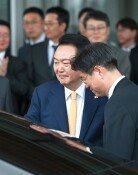President 'Dirty Harry' of the Philippines
President 'Dirty Harry' of the Philippines
Posted May. 11, 2016 07:30,
Updated May. 11, 2016 07:45
An Australian missionary died after a group rape during the 1989 prison riot in Davao City in the southern Mindanano Island in the Philippines. The then mayor recalled the moment. “As she (the missionary) was so beautiful, I should have (raped) her first.” In response, the Australian and the U.S. ambassadors protested, escalating into a diplomatic issue. Then, he said, “You’d better shut your mouth. When I become a president, I will cut the diplomatic ties.” Indeed, he has become the president of the Philippines.
He is Rodrigo Duterte, 71, was elected the president of the Philippines on Monday. While serving as mayor for 22 years, he created “death squads” and carried out 1,700 extrajudicial executions. The worst criminal city became safe. When he ran for president, he scarily said, “When I become president, I will hang out criminals’ dead bodies on the clotheslines. I will dump 100,000 criminals into the Manila Bay and fatten all the fish there.”
He got a nickname: “Dirty Harry of the Philippines." It is from the American movie “Dirty Harry” in which a detective starring Clint Eastwood handles criminals roughly. In a country where around 80 percent of the population is Catholic, the Filipinos supported him who said to the Pope Francis a “son of a prostitute” and told people “the disabled should consider a suicide.” Although there were many tough-speaking presidential candidates, he is the first one who has become president.
The origin of tough-speaking politicians is France’s Jean-Marie Le Pen, former head of the far-right party National Front. Despite his racist comments such as “The Nazi’s holocaust is a minor thing in history,” he reached a run-off in the 2002 presidential candidate. Brazilian congressman Jair Bolsonaro emerged as a presidential candidate hopeful for the 2018 presidential race. He said, “You’re a woman who does not deserve even touching” when someone called him a “rapist” after he pushed a female lawmaker. Politicians’ tough-speaking is a sort of mutated populism that pierces the mind of voters who are angry about the established politics in the midst of poverty and the absence of security. Tough-speaking is also common in Korean politics. I’m worried about what if star politicians such as Donald Trump emerge in Korea.
박제균논설위원 phark@donga.com







